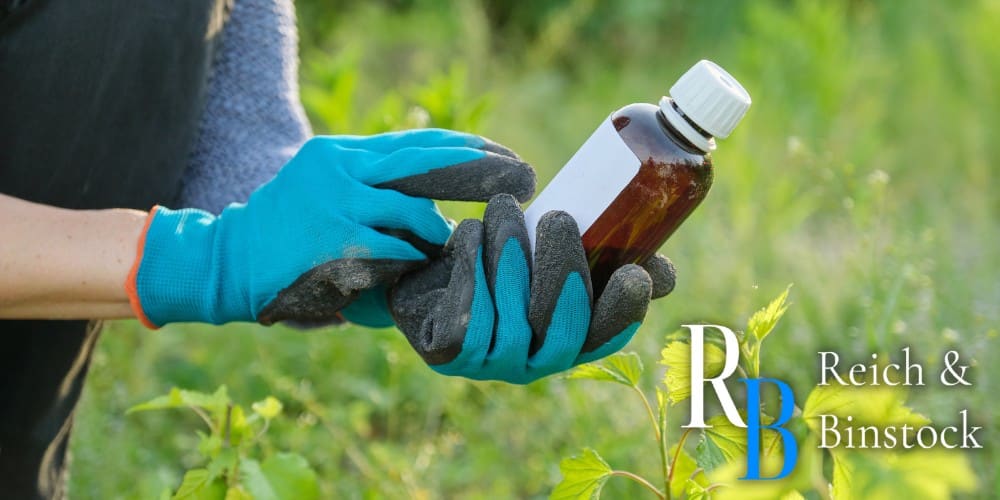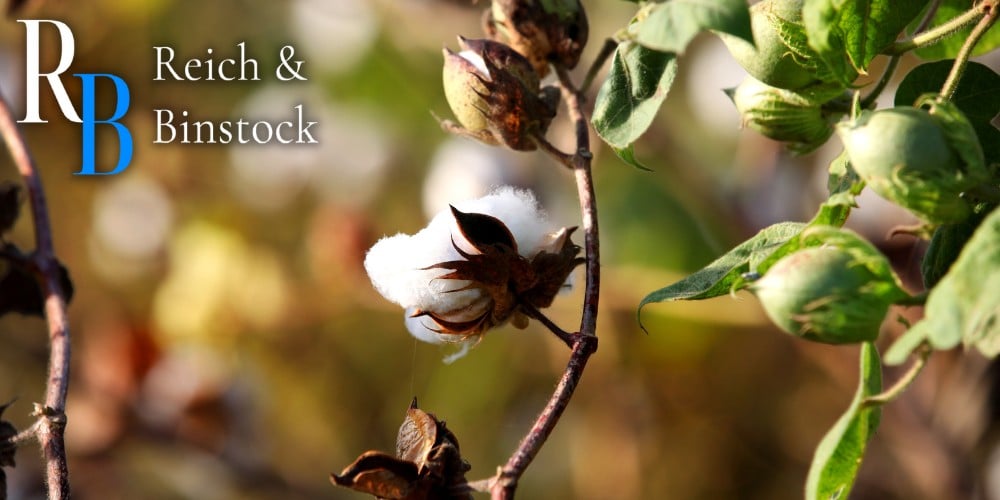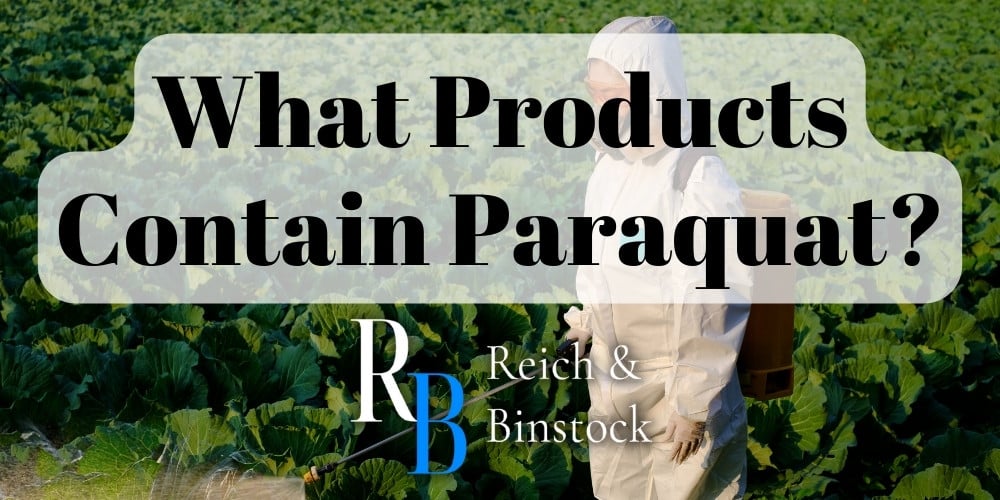Herbicides and pesticides are an essential part of the farming industry. However, many of these chemicals are extremely dangerous and toxic to humans. Paraquat is a prime example of a highly toxic chemical that is banned in many countries, but not the United States. It is a “restricted-use” herbicide that only licensed applicators may use. So, how can you avoid this dangerous chemical and how can you know if you’ve been exposed? This blog outlines what products contain paraquat, as well as what to do if you were exposed.
At Reich & Binstock, our nationally-recognized product liability lawyers have extensive experience handling mass tort and class action claims. This includes filing paraquat lawsuits on behalf of injured victims and their families. If you are one of many agricultural workers and other professionals who have suffered from paraquat exposure and poisoning, we’re here for you. To schedule a free consultation with us about your case, please call our office at 713-622-7271 today.
What Is Paraquat?
According to the EPA (Environmental Protection Agency), paraquat dichloride is one of the most widely-used herbicides in the nation. This powerful herbicide only has approval for commercial purposes in the agricultural industry. Paraquat and other herbicides aim to control weeds and other unwanted plants around crops, mostly in row-crop farming.
It is also used for the desiccation of certain crops, such as cotton, to prepare them for harvesting. Desiccation is the process of removing moisture from something with the intention of halting a plant’s growth at the appropriate time.
Why Is Paraquat Banned in Certain Countries?
As we stated before, paraquat and paraquat products are extremely toxic. It can very quickly cause serious injuries, internal damage, and even death. Because of these serious health risks, many countries have banned the chemical. The United States, however, has not banned the use of paraquat or paraquat products. Below, we list the countries that have completely banned the use of paraquat due to its acute toxicity.
- European Union
- Brazil
- Switzerland
- China
- Syria
- Austria
- Kuwait
- Sweden
- Denmark
- Finland
- Slovenia
- Malaysia
- Cambodia
- United Kingdom
- Germany
- United Arab Emirates (UAE)
What Herbicide Contains Paraquat?

To determine if you suffered from paraquat exposure, it is important to understand if you interacted with any products that contained paraquat. There are many different herbicides on the market, and in varying strengths. Paraquat is not approved by the EPA for non-commercial, non-agricultural settings. In other words, you won’t have been exposed to paraquat via something the average person can buy in a store.
Paraquat is a restricted-use herbicide that only certified applicators may use. A certified applicator is someone who is approved by the EPA to handle the substance. It is restricted only to certified applicators because of its serious health risks. As a part of their Paraquat Dichloride Human Health Mitigation Decision, the Environmental Protection Agency requires certified applicators to complete EPA-approved training. They must complete this training before handling the product in any way, including mixing, loading into a sprayer, or applying.
The following products contain paraquat, and therefore can only be used by certified applicators.
- Gramoxone (the most widely-known trade name)
- Quick-Quat
- Parazone
- Helmquat
- Para-Shot
- Cyclone
- Crisquat
- Firestorm
- Para-col
- Dexuron
- Devour
- Bonedry
- Esgram
- Blanco
- Tota-col
- Ortho Paraquat
- Garmixel
- Pillarxone
Keep in mind that this is not an exhaustive list of all paraquat brand names. Other weed control and grass control products also contain paraquat.
Does Roundup Contain Paraquat?
No. Roundup and paraquat are two different products. They are, however, both herbicides. What the two products also have in common is their involvement in lawsuits. Roundup’s active ingredient is glyphosate, which has been linked to an increased risk of certain types of cancer. Paraquat exposure, however, has been linked to Parkinson’s disease.
Paraquat Manufacturers
Just as there are many paraquat trade names and brand names, there are many manufacturers of paraquat. While the most popular version of paraquat is marketed under the trade name Gramoxone, other manufacturers produce and market this product under different names. These companies may be held liable if someone files a paraquat lawsuit after having developed Parkinson’s disease from using their product.
The companies that manufacture this dangerous herbicide are as follows.
- Syngenta
- Chevron Chemical Company
- Adama Group
- Drexel Chemical Company
- Helm Agro
- Altitude Crop Innovations
- Sinon USA
- United Phosphorus
- Innvictis Crop Care
If you believe that your Parkinson’s disease diagnosis may have resulted from paraquat poisoning or exposure, you may be able to seek compensation. Contact a qualified paraquat lawsuit attorney for more information.
Who Is at the Highest Risk of Paraquat Exposure?
Exposure to paraquat can occur in a number of ways, and it can happen to more than just those who work in commercial agriculture. According to the American Parkinson’s Disease Association, those in rural environments are more likely to be exposed to paraquat or to suffer paraquat poisoning. Specific examples of those who are at risk of the toxic effects of this herbicide include the following.
- Licensed applicators
- Mixers of the product
- Loaders of the product
- Workers on farms that use paraquat
- Owners of property that is near farms that use paraquat
- Children who attend school near a farm that uses paraquat
However, there are several other ways one can be exposed to paraquat. For example, if paraquat is being applied with a crop duster, this could result in a phenomenon known as herbicide drift. Herbicide drift occurs when the chemical is carried through the air to places other than the farm on which it is being used. This could easily result in accidental inhalation of the chemical.
How to Know if You’ve Been Exposed to Paraquat
Paraquat has very distinct characteristics for a reason – to lessen the chances of accidental ingestion. The herbicide is so powerful that as little as a teaspoon could lead to death if prompt treatment does not occur. If you are unsure if you were exposed to paraquat, think back on whether you interacted with a chemical with the following characteristics.
- Blue dye or coloring. Most products that contain paraquat will be blue or a very similar color. This helps to prevent people from mistaking it for another drink if beverage containers are used for mixing.
- Pungent odor. The strong, distinct smell of paraquat is very intentional. When people smell it, they will likely know from that alone that it is a dangerous chemical.
- Added agents to induce vomiting. If ingestion were to occur for some reason, the product also contains a certain agent that will cause someone to vomit.
What Crops Is Paraquat Used On?

Because of paraquat’s popularity and widespread use, it is still used on a wide array of crops, plants, and trees. Exposure to paraquat could occur from interacting with the following crops.
- Cotton
- Wheat
- Corn
- Soy
- Almonds
- Peanuts
- Artichokes
- Garlic
- Strawberries
- Pears
- Grapes
- Sweet potatoes
- Citrus trees
Paraquat Poisoning Symptoms
Another way to recognize paraquat exposure is to note the symptoms of paraquat poisoning. Due to its toxicity, paraquat poisoning can lead to the following severe symptoms.
- Kidney failure
- Scarring of the mouth and throat
- Ulcers in the mouth and throat
- Tissue and cell death
- Lung cysts
- Lung scarring
- Liver failure
- Dehydration
- Lung collapse
- Low blood pressure
- Imbalance of mineral salts
- Other digestive system symptoms
Contact the Paraquat Lawyers at Reich & Binstock
If you or someone you know developed Parkinson’s disease after using or experiencing exposure to paraquat, you may have the basis for a paraquat lawsuit. You deserve fair compensation for the long-term effects that this toxic chemical had on your life. That’s why the personal injury lawyers at Reich & Binstock offer a free consultation for clients. We can evaluate the facts of your case, determine whether you have a claim, and advise you of the next steps to take. To schedule your consultation with us, please call our office at 713-622-7271 today.













